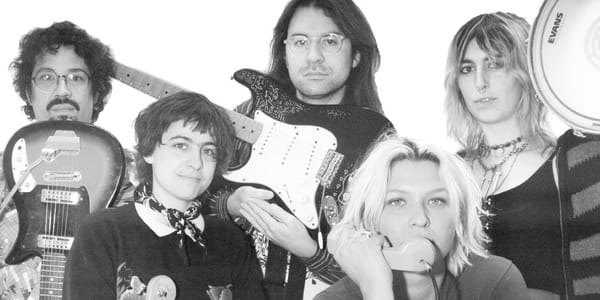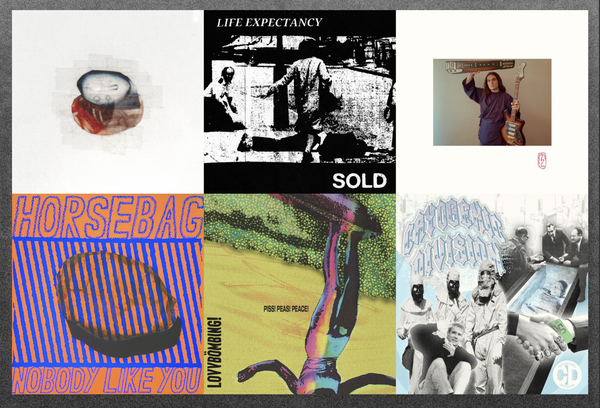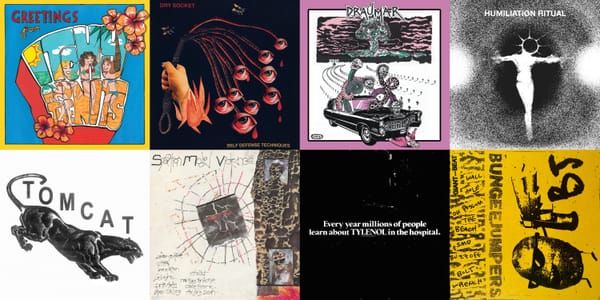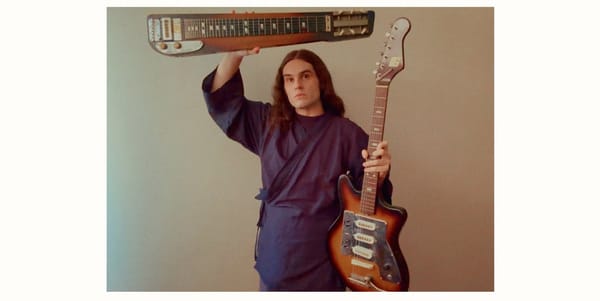rotary club could only be reached via reno bus station payphone
The Nevada punks have written entire records kneeling at the touch tone altar. This is what it meant for them to chat on their home turf.
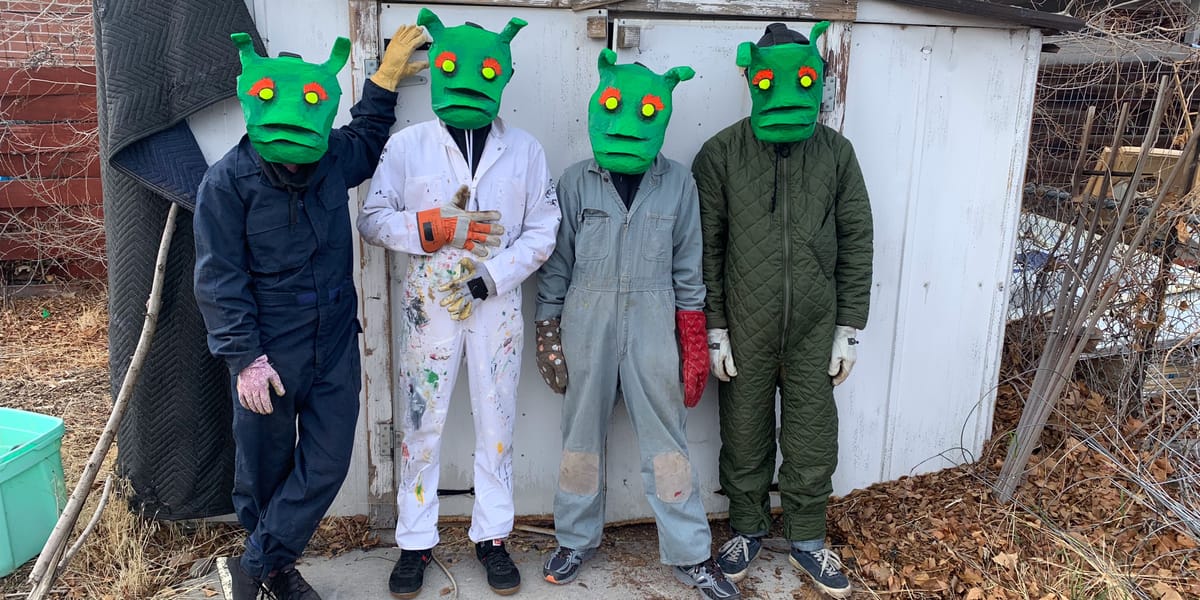
The Fourth Street Bus Station in Reno is unmissable—a semi-recently renovated building with a bus hoisted diagonally on a pole out front. At 10 a.m., I walked through the revolving doors, took a left down the hall, and found the payphones by the men’s room. Jammed behind one of the phones was a manila envelope emblazoned with a familiar globe symbol. Inside was a letter addressed specifically to me. There was a phone number and several quarters. (“Tokens,” the letter called them.) I dialed Rotary Club, who greeted me from their undisclosed location in the same city as this bus station.
All of that happened—a scene for me to perform plotted entirely by the Reno punk band. I was thinking I’d meet Rosie Rot, Clint Tone, John Line, and Ilya Scope in person. Instead, they instructed me to see this part of their city on my own. It’s an area defined not by casinos or squeaky clean new development, but people doing real life shit. It’s a residential hive of activity where folks smoke, wait, wash their hands, hit the vending machines, and catch the next bus. I held the receiver against my face, leaned against the wall, savored the bathroom smell, and spoke loudly to Rosie and John from an echoing hallway as commuters, the hung over, the unhoused, and cops gave me side-eye.
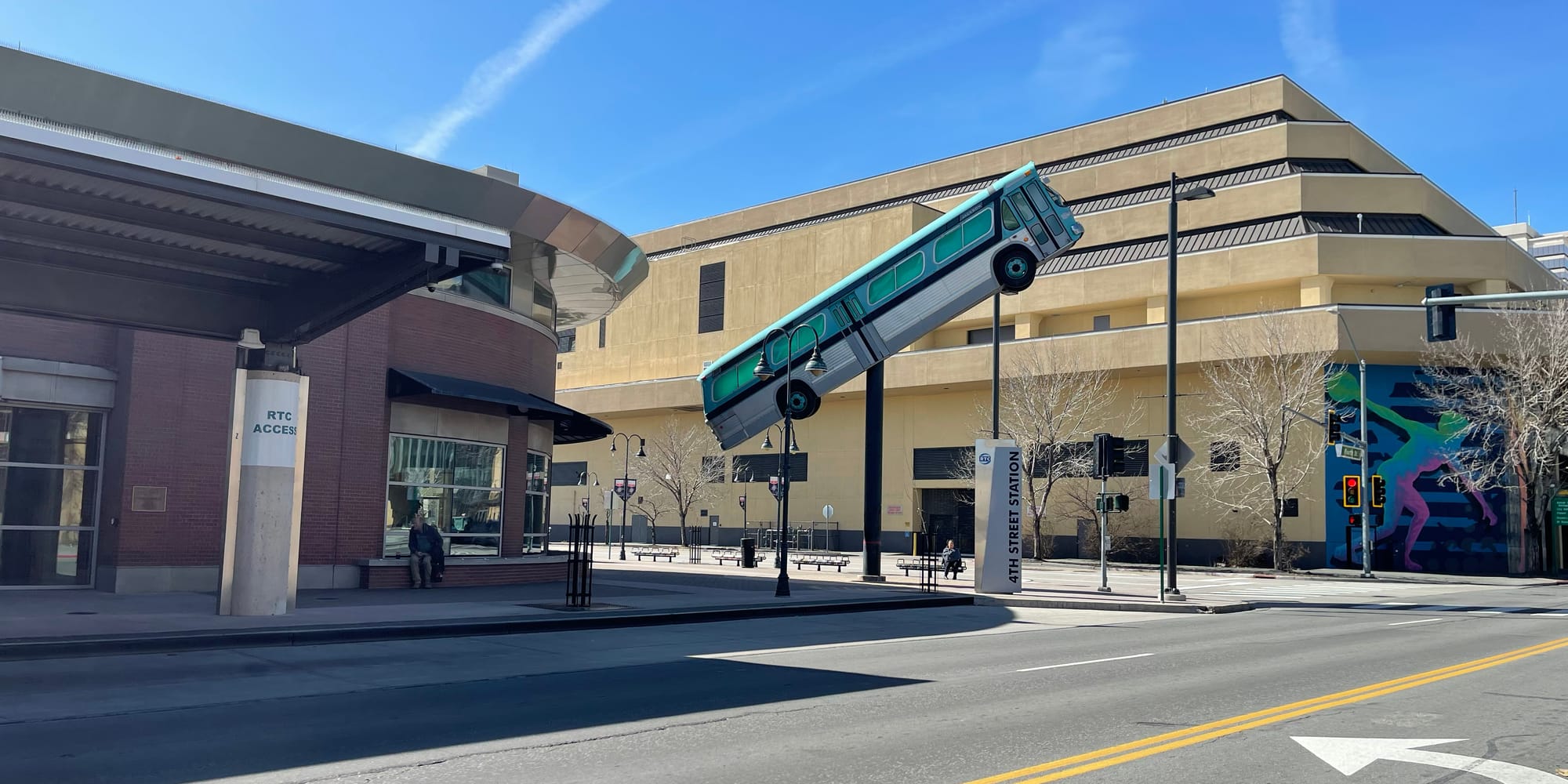
This happened in March. Four months earlier, they’d released their new album Sphere of Service on Iron Lung. It’s garish and punchy music not easily boxed in as “art punk” or “new wave.” Frankly, art punk and new wave aren’t supposed to rip like this. It’s rock’n’roll made by sharp-eyed over-analyzers in matching uniforms, and they shred. The songwriting looks at the landline-only communication of yesteryear, days when a ringing phone raised a collective question mark over the heads of anyone in the room. No caller ID or whatever—just “I guess I’ll see who it is” or “I’m way too tired for this.”
That’s Rotary Club’s entire deal—punk that prods a time-locked subject from every angle, and their singleness of intention lends itself to a front-to-back exceptional record about bureaucracy and communication. Under their watch, the busy signal throbs with desire and thwarted possibility. This is a band that converted vintage payphone boxes into their live show amps and gear. They absolutely collect old phones, and they’re always thinking about what these machines represent. Listening to their songs, I’ve been wondering about it myself. It’s playful music, but they don’t take their muse lightly. These are punks working hard in commitment to their aesthetic source material.
Four weeks after our conversation, I received another envelope-based communique from the band. This time, it was a cassette in the mail featuring a recording they made of the chat from their end. My voice on the call sounds like a whisper beneath tidal waves of tape hiss, but everything else comes through well. Sometimes, a chunk of the tape is bulldozed by an added-in phone line disconnect tone. They were never going to email me this audio. A landline band sends tapes through snail mail. Live the gimmick, brother. Our chat was edited for length.
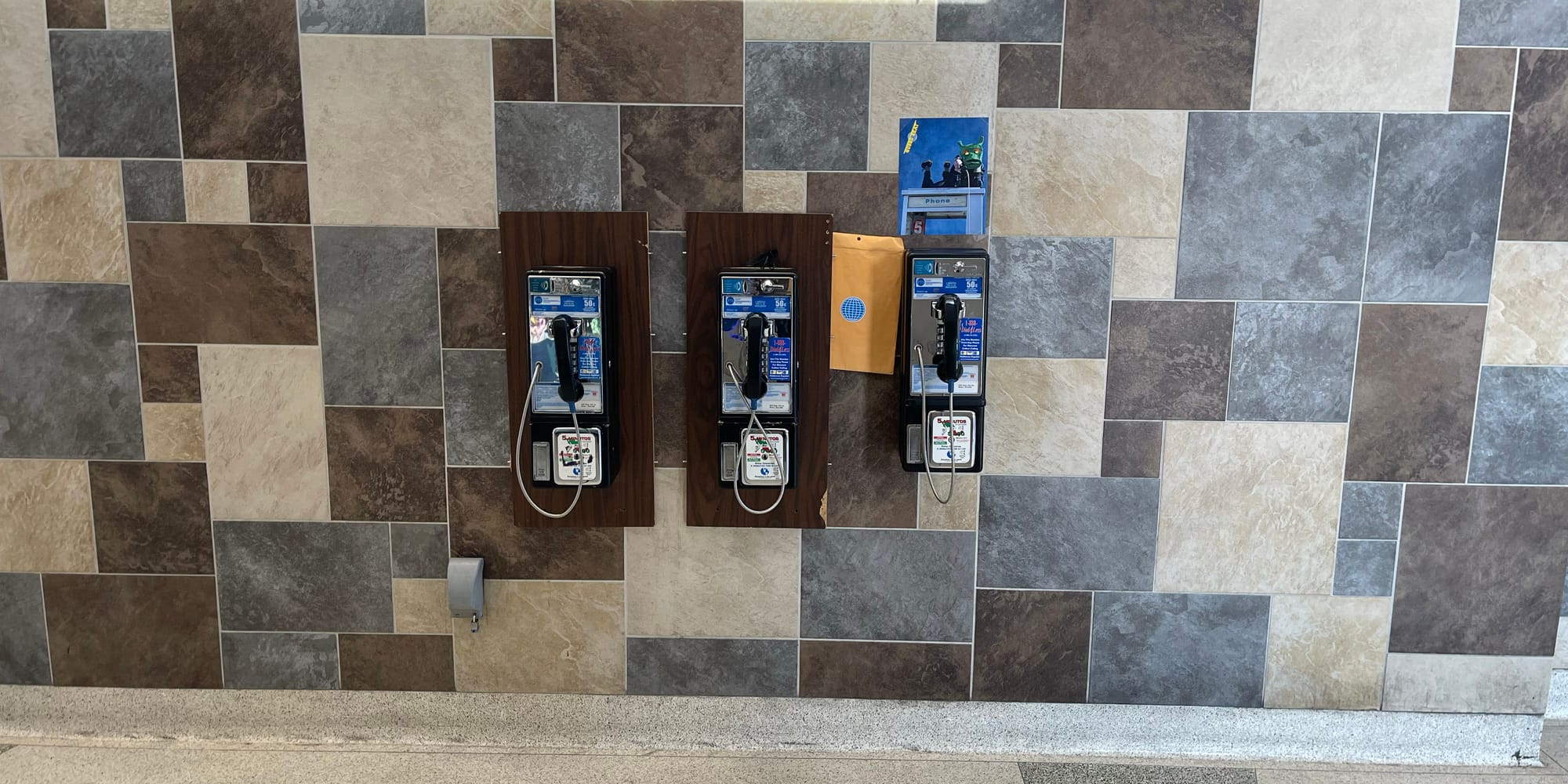
Welcome to Rotary Club, where we all live and die in the sphere of service. The following is a recording of a transmission received from Evan Minsker on March 8, 2025 at approximately 10:01 a.m. at the RTC Bus Transit Station on 200 E. 4th Street at Reno, Nevada. Upon successful connection to a Citizen Node Terminal, henceforth referred to as a “payphone,” voice activity was detected and duplex signal circuits were brought online to catch roughly 35 minutes of communication. All information gathered from the payphone is deemed confidential and subject ot any and all ITU policies and protections. It is noted that only one of the three payphones was able to achieve connectivity on the date and time referenced above.
John Line, guitar: Hello, Evan. Do we have your permission to record?
Yes, of course you do.
John: This is John Line of Rotary Club. I’m glad that you received our official communique. It seems like our duplex speech circuits are working. Rosie, can you get the freezeout to 500 milliseconds, please?
Rosie Rot, vocals: Yes.
John: Apologies in advance, our time-assignment speech interpolation has been acting finicky as of late, so there may be some unavoidable cross-talk that we might have to deal with, so we definitely appreciate your understanding in that matter.
Thank you very much for the instructions. Tell me about this specific payphone I’m on, do you have experience with it?
John: We do, actually. It’s one of our designated citizen nodes, a really useful point of connectivity. They’re actually harder to come by these days. Fourth Street Station in Reno, Nevada is one of the last bastions of wall-mounted citizen nodes, so yes, we do use those quite frequently. It is our location of choice, actually, between that and two other locations spread throughout the fine city of Reno, Nevada. We do have one on Dickerson Road and we do have one on Fourth Street as well.
I’m on one of the three phones. You instructed me to use the one on the right, but I’m calling from the one on the left. The middle and right ones aren’t working.
John: OK, will you take notes on that please?
Rosie: Yeah, noted.
John: Thank you, yeah we’re going to talk to the general secretary over at the ITUT Standardization Sector to see if we can’t get that looked at.
You’re in Reno right now?
John: We are in Reno.
Why don’t you want to talk to me in person?
John: We kind of prefer to operate in the shadows, so to speak. We also feel that life these days, it’s very interesting to add little points of color where we can. I guess I turn that back to you: What would you find more interesting, to meet in person or to use the designated citizen node at Fourth Street Station?
Oh, this is definitely interesting. You’re not using the word payphone, do you not subscribe to that term?
John: It does have a little bit of a negative connotation for us, to a degree. We definitely prefer citizen nodes, but we’re not opposed to it. If it makes anybody feel any better, we can use the term payphone.
Tell me about the payphone boxes you’ve converted into your live show pedalboards and amps.
John: Our head of technology, Ilya, actually is not with us, but he’s the architect behind a lot of that. As with a lot of bands, projects, missions, whatever you like to call it, a lot of this was rooted in some kind of aesthetic to some degree—something that spoke to us. We noticed that citizen nodes/payphones were almost perfect for housing guitar and bass amplification, and so with that in mind, we decided to turn one to the side, put some tubes inside of it, and Ilya worked his magic. We feel that effort is lacking in certain things, especially in music endeavors, so why not go a little bit further with things?
Are you all from Reno originally or did you find yourselves there?
John: We all come from a variety of places. I was born and raised in the Bay Area and I’ve lived here since early high school. I’ve moved to other places and I’ve generally come back. It’s a very interesting city as small cities go, especially where it’s at now. It’s in a perpetual state of decay so there’s a rebirth in some aspects. But this is home to us.
Rosie: Ilya and I moved here from the Bay. I’m from Los Angeles, Ilya’s from the Bay, and Clint is from outside Sacramento.
Were you involved in other bands together?
John: We don’t really like to discuss previous things we’ve done, but we have all been playing music in different capacities and different bands for decades. We’ve played in other bands with each other, we’ve known each other for 10+ years. Reno’s a very small music scene in general, so a lot of people play in multiple bands.
The way this came about was four or five years ago, I was in a project that was fading out. I reached out to Ilya and a few other people. Really, this whole band started with a bit of a visual image, to some degree. This is the only band I’m really going to reference, because I don’t really find that very interesting, but there’s this vision we had of the Corpsicles’ “Now You're Gonna Leave Me” 7” and the cover. Like “what if instead of popsicles, there was rotary phones?”
Between the record and what we’re doing right now, I’m curious about the conceptual reality of the band. Do you acknowledge a reality where cell phones are a real thing?
John: We’re not looking necessarily to be in any kind of a movement. It’s just more indulging in a certain kind of perspective, I suppose. We find it interesting to look at the world of telephony through the lens that existed in an era from the late ’70s up until the formal breakup of the Bell monopoly in ’82. We’re looking at the way telecommunications and technology was perceived and how pervasive it may have seemed at the time in that era lends itself to a very interesting perspective in where we’re at in the modern days.
There’s no denying that the utility of modern technology is great, obviously with it there’s pros and cons, but we don’t really like to speak to that. We’re painting a picture to a degree and people can take from that what they want. We’ve always found that rather than being very blunt about any kind of perceived message, it’s more interesting and more impactful for people to come to realizations on their own.
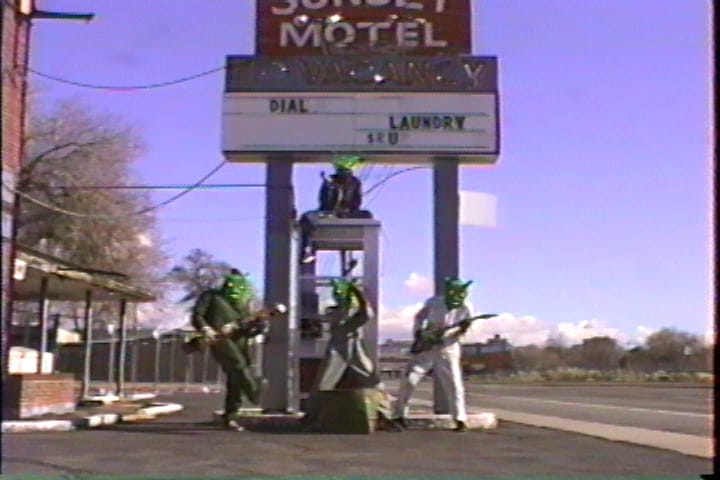
Hanging out here, I keep thinking about how my dad used to play Asteroids at the bus station. It was a place where you could make a call in public when you needed to. Now you can do both of those things on your phone anywhere. Your songs remove that step of instant gratification; how much are you thinking about that conceptually?
John: Well yeah, it’s a slippery slope, right? There’s no denying that there is an incredible amount of convenience that people have now in the palm of their hands, right? And initially, it becomes very gratifying early on, to get overwhelmed by all the prospects of all the things you could do that you couldn’t do before, and then somewhere along the line it settles into normality. Sometimes it settles into almost an extension of yourself that you can’t even differentiate with anymore. The use of phones now is so intertwined in our very being.
Back in the day, for instance, on the landline, if the phone went out, that piece of technology was so ingrained in people’s every day that they would actually go “OK, the phone’s out, I now need to call somebody to figure out what’s going on and complain,” not realizing that what you went to instinctually was the source of actual failure, right? Sometimes, when things become so intertwined in our very being and our everyday habits, it’s interesting to witness. I think there’s a certain simplicity when points of communication have a designated space as opposed to just being with us all the time.
You made a record about these devices, so I’m curious if you have intentions to keep writing within that framework.
John: Yeah, absolutely. These days, not that you’re necessarily on a quest to do anything different—obviously so many things are rehashed over and over—but I think when you hit on a certain theme or an aesthetic and you can really get behind that, and we like to think that the music backs things up as well. It just feels really right for us. My thought is why not put effort and a little bit of artistry and a little bit of intrigue into something that you do? Whether it’s taking—and I’ll use the term payphone, I’m comfortable with that… whether it’s payphone amps, whether it’s records that are all about telecommunications, we all find telephony very fascinating. And why not? If you’re going to do something, why not do it full bore? I understand there are people who can think things are very gimmicky or “that’s a schtick,” and that’s fine. We are completely OK with that. We just like the idea of putting effort into the things we do, which is part of the reason you’re holding and speaking into a grimy receiver.
OK so I got here and there’s the manila envelope that got me here, but there’s also a print-out photo of somebody wearing a green papier-mache goblin mask atop a phone booth. What can you tell me about what I’m looking at here?
John: Is that pure coincidence?
Rosie: Yeah, I think that just happens to be there.
John: We’re doing a video for our song “TDOS,” and that’s some imagery we got as we went to some different locations. To a degree, the video references a goblin world and a normalized world—seeing the two sides, the pros and cons, of telecommunication. I’m not trying to get too heady about this as a metaphor. Papier-mache looks cool.
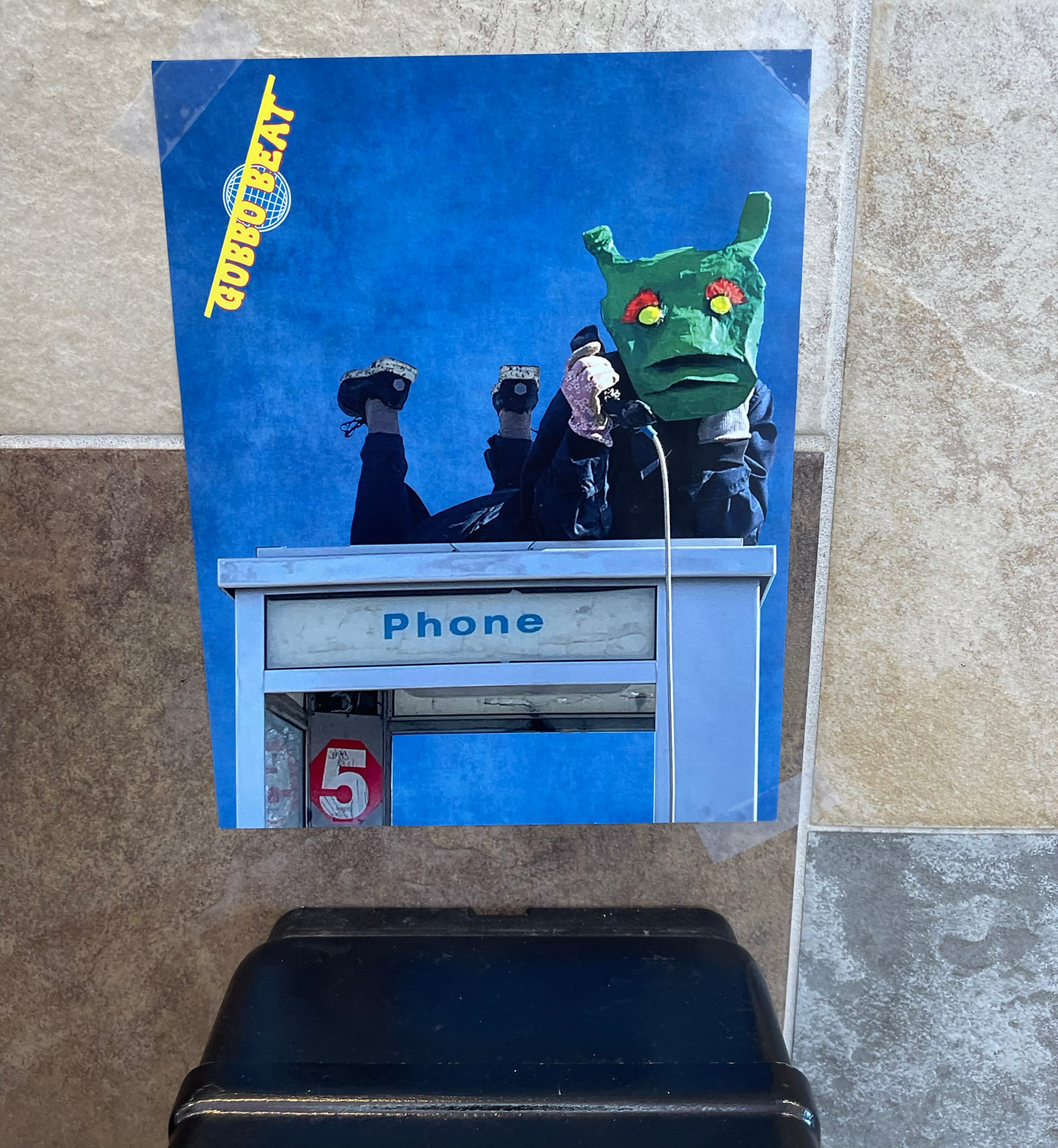
Where’s the band now, are you thinking about the next record or still in the post-album wind-down?
John: We definitely have plans to continue recording. We are songwriting, but we’re at that space, too, where you release the record and go on small tours to go and promote the record. There are different stages of the band. We’ve all been in bands so long, the really interesting part that we all get excited about is the songwriting part. It’s just fun. That’s the most fun part, generally.
Rosie, you’re up front singing and shouting about touch tone phones. Are you excited about what the band does going forward or would you want to break out thematically and go wherever you want?
Rosie: Speaking about touch tone phones and whatnot, I feel like the entire world is based on communication, so I don’t really feel that we’re limited to citizen nodes or payphones or touch tones or the ITU. I do feel that everything in our lives as human beings is based on communication. I think talking about telecommunications is just a microcosm of that.
I’m curious about the Rotary Club experience of Reno. Since we can’t meet in person, where should a traveler go to walk a mile in Rotary Club’s shoes?
John: I would say usually more the outskirts. You want to go along the depths of Fourth Street, that’s usually a pretty good way to understand the landscape of Rotary Club, as well as some areas of the North Valleys—the more fringey areas that are a little more decayed. I grew up in a trailer park up in a place called Lemon Valley, so I think that desolation and withering away to a degree—some of these area feel like these degraded time capsules. There’s not many places that you can find payphones, but some of those outlying areas, you can definitely still see that. They’re not necessarily very used. Those areas are very much in the Rotary Club feel. Especially where you’re at right now, right downtown in the shadows of some of the casinos that are past their glory days, and this is what Reno is about. To a degree, it almost has a feel of a city that’s been slowly dying for a while, and out of that can come some pretty interesting things.
Rosie: It simultaneously has the feeling of a city that’s slowly dying but one that aesthetically keeps trying to revamp. The bus station you’re in has been pretty recently been flipped or remodeled. There’s new-ish tile on the walls, stuff like that. If you look around, my guess is you’re mostly surrounded by people who are mostly living on the street where it’s literally illegal for them to sit or stand anywhere else in the city right now that’s not the bus station that’s warm. We just passed a sit/lie ordinance, which means they can legally sit in there to stay warm but there’s nowhere else. That existing at the same time as the pathetically hopeful overdevelopment. There’s this constant talk of Reno’s growing, but all of the luxury housing to accommodate the growth is empty, you know? That’s where the people are. So I do think it’s this duality, like John’s talking about, between the decaying Lemon Valley trailer park and the vacant casinos downtown and all this empty space, and then people on the street.
I’ve been appreciating some individual signs that I’ve been seeing around here. Is there a sign that you think best sums up the vibe of contemporary Reno?
Rosie: I think it’s on Second Street if you’re going West in the middle of downtown, it’s on one of the buildings. It says: “New Luxury Housing Opening 2022.” I think last year they blacked out “2022,” so now it just says “Opening.” Because you’re here on the weekend, you should absolutely go to Cal Neva karaoke. I think on the surface it can feel strange and depressing, but I think it’s a very wholesome, special place where a lot of local people are hanging out and go every week for karaoke.
Tell me about your uniforms.
Rosie: They’re a standard jumpsuit.
John: We do have some protective coveralls we like to wear, and we have the Rotary Club logo on the front and back. We wear different colors depending on the mood. What do we have right now, blue and red? It’s a team effort here and we like to embrace that side of telephony. That’s an inspiration from linemen and all the people that work in the industry in the early days of telephony.
Would you welcome other people outside the band to identify as members of Rotary Club?
Rosie: I don’t know if we want to get into identity politics on this call, you know?
I’m just saying—you have uniforms, you have an aesthetic North Star in telephony, you have clear iconography. Do you think you’re on the slippery slope to becoming a cult?
John: Aesthetic North Star, I like that! If we get to that point, I’ll consider that a good problem to have. Right now, we’re trying to get rid of a few records. [laughs]
Rosie: I like where we’re going with that. I’ll take it.
John: We’re willing to shoulder the responsibility, if that answers your question. And by the way, we have records for sale.
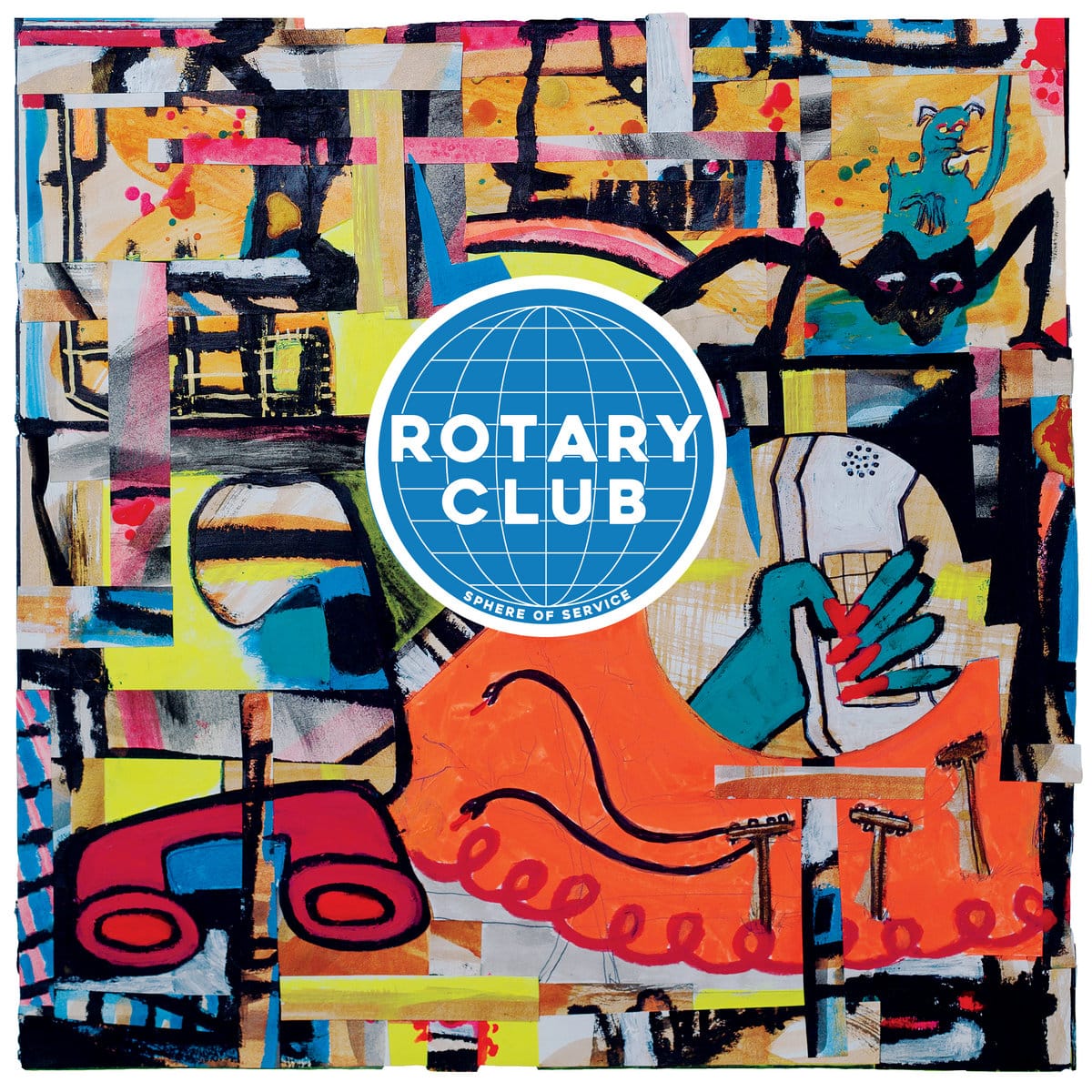
I’m looking behind me here at a couple vending machines. Assuming you’re familiar, what’s your go-to vending machine snack out here. Y’all ever get a snack out of these guys?
John: I believe I don’t. My diet’s fairly strict.
Rosie: Yeah, we all have weird hippie diets.
I mean they’ve got some fig bars in here.
John: Oooh.
Rosie: Is it Nature’s Bakery?
Yes.
John: I like those.
Rosie: Those are local, indigenous to Reno.
Oh I didn’t know that, we’ve got these out by me, too.
Rosie: Yeah, it’s not my favorite, but I’ll eat one in a pinch. The brownies are good.
Y’all operate from the shadows, but you still share photos of yourselves right? It’s not a fully anonymous project in that way?
John: When we play live, obviously we don’t wear masks or anything, but again, in this day and age, everything is so accessible. A little mystery is a fun element to have in the world. I don’t think there’s enough of that. Everything’s so immediate and accessible.
Do you have a favorite phone model right now?
John: Personally, the Trimline series of phones was pretty nice. It was pretty revolutionary for its time: small, compact, sleek, and pretty affordable. That is a touch tone phone so I’ll roll with that for now. And obvious rotary phones in general, very nice, just the standard models. The Trimline is a phone every single household had. It was very pervasive. It‘s not the fanciest one, but that’s the off the top of my head response.
Rosie: It’s not a phone, but the Phone Mate, the original consumer answering machine. I think it’s the Phone Mate 400.
Do you all collect or just admire?
John: We don’t have an obsession, but if there’s an opportunity, we’ll go to thrift stores and such. We collect a bit. That’s the thing, we by no means profess ourselves to be experts in telephony. Even if you look over a brief period like the late ’70s to early ’80s, there’s so much to learn about that you did not know. Even outside the technological aspects of it, there’s a really interesting history. Which means a lot of fodder for songs.
When you sent me the original plan, I thought you were going to direct me to a second location. Did you consider that would be my thought process?
John: Our first thought process was “is this person going to tell us to fuck off and kick rocks” because it’s too ridiculous, but since you’re a good sport and we appreciate it, no, we like it just like this. We didn’t ever even think about that. Plus, honestly, half the band is out of town and left us with this. It’s been a great conversation, but we’re really scattered so we couldn’t mobilize things as much as we wanted to. But I like it like this. You’ve interviewed countless bands, but I doubt you’ve ever interviewed anyone over the payphone at the Fourth Street Station.
Rotary Club will be on tour at the end of May 2025. Find them at the Holland Project in Reno on May 28, San Jose’s Art Boutiki on May 30, Dark Nectar Coffee in Atascadero, California on May 31, and at the Witch’s Lair in Davis, California on June 1.


